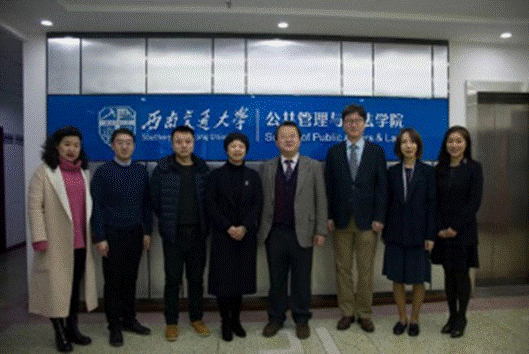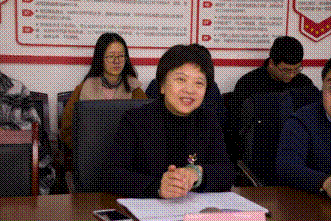On the morning of January 3, professor Cui Xingshuo, dean of graduate School of Korea University, went to the School of Public Affairs & Law of SWTJU for academic exchange in the field of aging governance with the International Scientific Research Institute of Aging. South Korea university professor Heungsuk Choi, dean of the graduate school (Heungsuk Choi), professor Jin Xuan (Hyunjoon Kim), Jin Xianqing (Hyunkyung Kim), Yan Xiaozhen (Hyujin Eum), Si Chuan provincial department of social welfare and charity promotion Huang Yuzhou, Pi Du district civil affairs bureau, deputy director of the chengdu endowment service operation guidance center Li Changgen, party committee secretary Gao Fan, international aging, secretary of the communist youth league, vice President of the academy of sciences, professor Yang Yifan, secretary of youth league committee Xue Jing attended this meeting. In addition, there were students from Sichuan University, Southwestern University of Finance and Economics, Sichuan Normal University and other brother universities, as well as directors of relevant pension institutions, who were also present at the meeting. The meeting was held by Professor Yang Yifan.

At the beginning of the meeting, Professor Gao Fan expressed her heartfelt thanks to Professor Cui Xingshuo and his delegation for visiting our school, and then introduced Southwest Jiaotong University and The School of Public Affairs & Law, especially mentioned that the public Administration major of our school was selected as one of the first national first-class major construction. In this regard, Professor Cui congratulated and introduced the general situation of Korea University and his research direction in recent years, hoping to have more exchanges and cooperation with our hospital in the field of aging governance.

In the speech communication link, first of all,professor Heungsuk Choi gave the speech with the theme of"the institutional arrangements for the health services in OECD countries". From the perspective of institutional arrangement, Professor Cui analyzed the reasons why different countries in THE ORGANIZATION for Economic Cooperation and Development have different performance in health service, evaluated the public health service system from the three aspects of effectiveness, efficiency and equity from the perspective of financial resources, service providers and service supply rules, and put forward the thinking and insights of multi-path innovation in health service system.
Later, Qian Lei, a graduate student of our college, Shared his research results with Professor Yang Yifan with "Comparison of index and Survey on Aging Governance and global discourse" as the theme. Through the study of various evaluation index systems, a complete analytical framework is provided for the universal practice of "active aging" at the international and national levels, in the hope of promoting the realization of self-worth of the elderly and completing the transformation from prolonging life to improving life quality.
Professor Kim Hyun Jun-kan introduced to the participants the inter-generational difference in willingness to pay for elderly and child welfare services in Korea through his investigation of 'The Willingness to pay for elderly Public services (WTP) for elderly public services in Korea' and the correlation between citizens' satisfaction with public services and willingness to participate in elderly public services and child welfare services, thus suggesting that the government should consider the competition between different age groups in welfare resource allocation. And take effective actions to enhance citizens' willingness to pay for public services.
In his speech "An Analysis Framework of Digital Inclusive Governance for Active Aging" , Pan Junhao, an undergraduate of our college, pointed out that the digital divide of the elderly is the new inequality in the information age as the starting point, and proposed that existing researches mainly focus on the elderly themselves, while ignoring the underlying social issues and institutional design. Therefore, he used the concept of "cultural gap" to redefine the digital divide of the elderly and proposed to establish an age-friendly information infrastructure. To achieve inclusive digital governance that puts people first.
At the end of each round of reporting, both sides had a full discussion and exchange. Professor Yang Yifan mentioned that the research results of the Institute in the aspect of "measuring the value of health care service quality for the elderly" were closely related to the "health service" studied by Professor Cui. The meeting ended with professor Cui Xingshuo and his delegation discussing the future cooperation direction with our institute, and Professor Yang Yifan launching the initiative of "Jointly building an international Knowledge Center for Aging Governance in China, Japan and South Korea".
This visit by Professor Cui and his delegation to our college for academic exchanges and cooperation communication is the opportunity and starting point for our college to strengthen in-depth cooperation and exchanges with Korea University. It echoes the "Outlook for the Next Decade of China-Japan-KoreaCooperation" proposed in the eighth Trilateral Summit Meeting held in Chengdu on December 24, 2019, to enhance the friendly cooperation and mutual benefit between China and Korea from an academic perspective.
Korea University (고려대학교) is one of south Korea's top, a world-class comprehensive research University, and University of Seoul, Seoul National University) and Yonsei University (Yonsei University) and called "the sky" (S.K.Y.) at the University of south Korea. The university is also a member of the Alliance of Pacific Rim Universities, the founding member of the Asia Pacific Association for International Education, the Asia Pacific Alliance for International Trade Education and Research, and the Founding member of Universitas 21. It was founded in 1905 by Li Yong-yi, then minister of the Korean Imperial Internal Collection Institute, with the idea of "saving the country through education". Formerly known as the Private Pucheng Special School, it was the first higher education institution established by private capital in Korea.
Korea University has a long history, ranking 2nd among All Korean universities and 1st among private comprehensive universities for a long time. According to the QS World University Subject Rankings 2018, the University of Korea has seven disciplines in the top 50 in the world, 22 disciplines in the top 100 in the world and 12th in the QS Asian University Rankings 2019. In 2019, Korea University was ranked 83rd in the QS World University Rankings 2020 and 179th in The Times Higher Education World University Rankings 2020.
As the most prosperous institution of higher learning in South Korea, Korea University has been cultivating modern talents with new academic disciplines since its inception. In its history of more than 100 years, Korea University has played a positive role in the development of politics, economy, society, culture and other fields in South Korea, and is known as the "University of nationalities".
Reporter: Chen Yi Dan, Ye Caixu
Photography: Xu Wenlin and Pan Junhao



